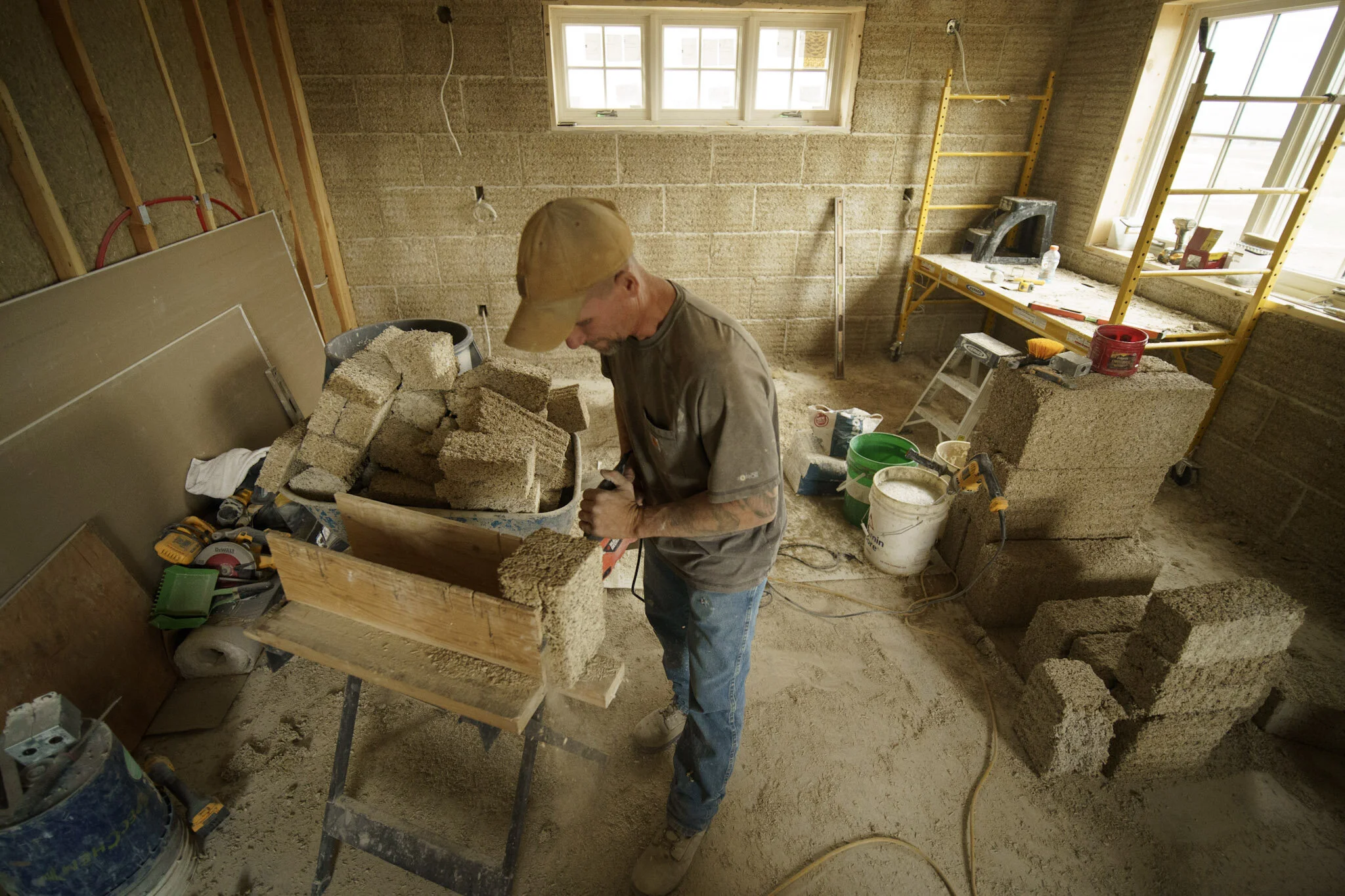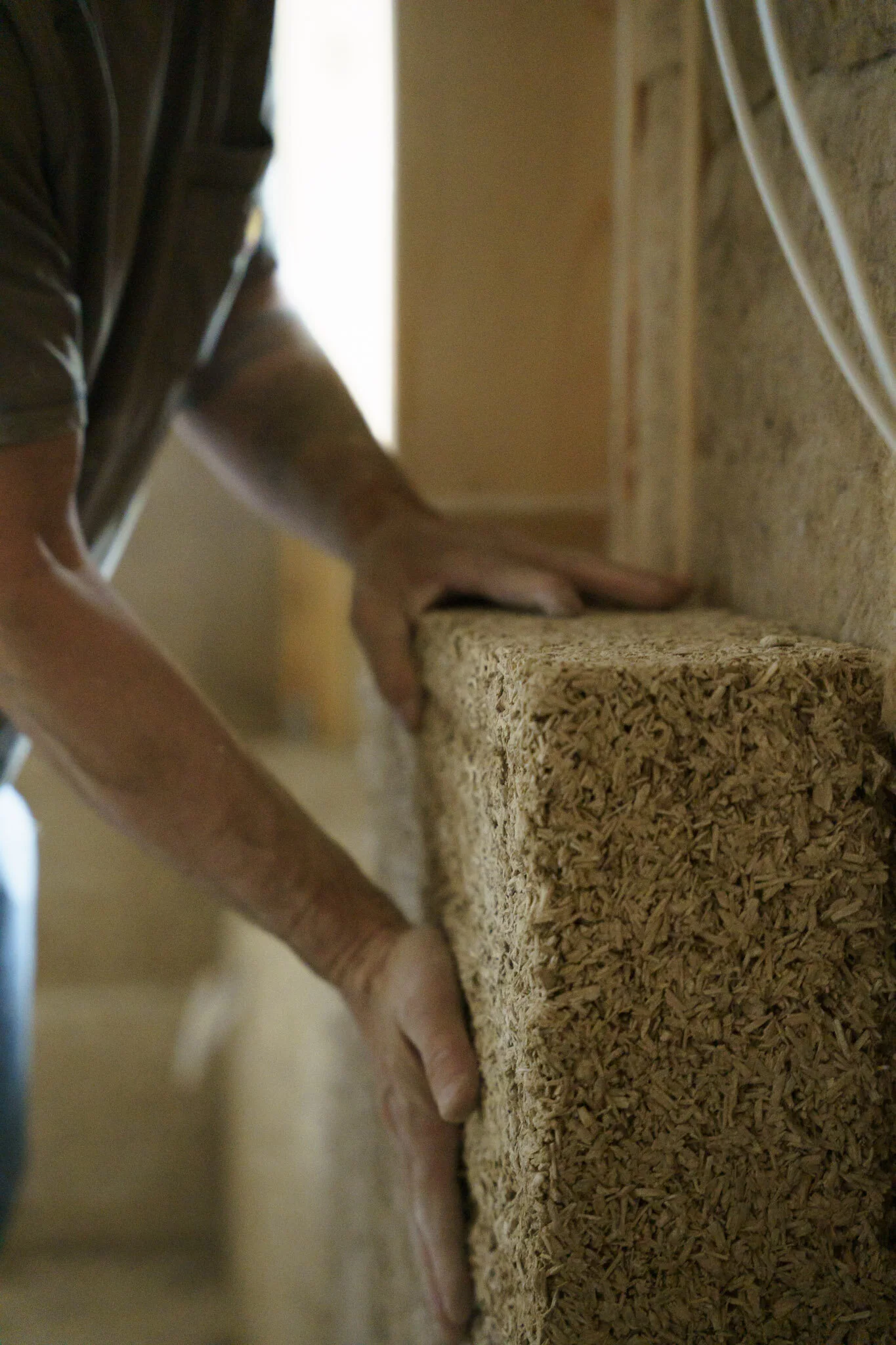Spotlight: Plug-and-play hemp products are ready for Montana winters
A contractor works with imported hempcrete insulation blocks from ISO Hemp at the Bozeman, Mont., build. Photo courtesy of Mary and Richard Elston.
By Jean Lotus
In Bozeman, Mont., where winter often lasts into late spring, homeowners Mary and Richard Elston chose two off-the-shelf hemp building materials to create 12-inch highly insulated walls in their new 2,900 sq. foot home outside of town.
The Elstons wanted a “green home” and to “get away from VOCs,” Mary Elston told HempBuildMag.
The Elstons loved the idea of hemp construction, she said, and attended Hempitecture’s 2019 Hemp Building Summit in Ketchum, Idaho. But she knew an in-situ handbuilt wall system was unlikely to be time-efficient in Bozeman where “we get about six months of winter,” she said.
Subscribe for HempBuild Magazine’s free newsletter
Instead, the couple worked with hemp products that could be swapped out for ordinary construction materials and be built by ordinary tradespeople: hemp insulation batts and masonry blocks.
With the encouragement of their architect, the new house was built with a wall system featuring 2 x 6 external framing timber.
Luckily the frame was built in August, before lumber prices skyrocketed, Richard Elston noted.
“The framing was still more expensive than we were expecting,” he added.
Contractors installed Hempitecture’s HempWool insulation batts (which, unlike fiberglass or mineral wool, require no special handling or gloves).
Click here to go to our FREE online community.
Then a masonry contractor built a 6” inner wall of hemp insulation blocks, imported from ISO Hemp in Belgium. The new hemp walls provide super insulative properties in Montana winters where the temperatures can drop to -7.
“Thermal bridging is reduced by the hemp block envelope inside the 2 x 6 hemp framing,” Richard Elston said. “The mason who was stacking the blocks loved it and said he wished everyone would do it.”
The couple also found less-toxic plywood and Columbian cabinet wood that’s made with a soy based-glue.
“We kept telling the contractors, none of that orange foam around the windows,” Mary joked.
The couple said they knew they would spend more to make the home a leading edge showpiece.
“We knew it was a prototype house and there would be extra costs to this experiment,” Richard said.
“The shipping from Belgium cost as much as the bricks themselves,” he added. “But if you could source the hemp locally, we wanted to show how this could be done with ordinary skilled tradespeople,” he added.
Jean Lotus is editor and publisher of HempBuild Magazine. jeanlotus@hempbuildmag.com
Hempcrete insulation bricks are installed over a frame wall insulated with HempWool fiber insulation batts. Photo courtesy Richard & Mary Elston
Please Support Our Classified Advertisers
(To find out more about advertising CLICK HERE).
Training and Education
Publications
Hemp Hurd (shivs)/Hemp Fiber/ Hemp Microfiber
Hempcrete installers/Insulation subcontractors
Haven Earth PMA: Bio-Design and Conscious Project Management Consultancy
Hempknowlogy: Home of the Hempjet: America’s first hempcrete spraying system. Manchaca, TX
Lime Binder
Hemp Batt Insulation/Supplies
Green Builders
Hemp Building Engineers
Hemp Genetics
Professional Associations
Evants



